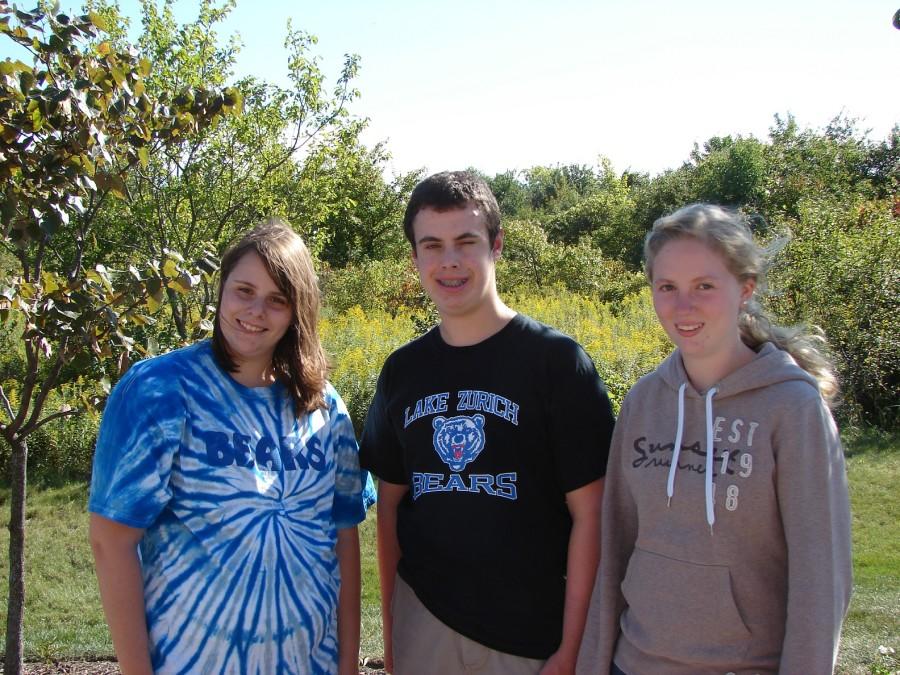Every few years students travel around the world to come to LZHS. Lake Zurich and Nittenau, Germany are paired together as part of the sister city program; they correspond with each other and exchange students. This is the case with new student Ines Pfab, sophomore.
“[My first impression of America was] it was great and very warm. I already knew a few things because [my friend] told me a lot about the school and everything, and my host family told me a lot through email writing,” Pfab said. “[I thought LZHS] was very big because my school in Germany only has 300 students.”
Pfab wanted to come to LZHS because her friend came here last year and told her it was great, Pfab said. Pfab is living with the Pope family first semester. Brett Pope, sophomore, is in German class and volunteered to be a host brother. Second semester, Pfab will live with the Abad family, Andrew Ziarnik, German teacher, said.
“My host family is very nice and we Skyped often before I came here, so I knew them really well,” Pfab said. “I’m with two families; the other one I didn’t get to know as well as the first family, but we wrote emails and things like that.”
Pfab and Pope are in the same geometry and driver’s education class, among others, which Pfab says will be helpful. Pfab is taking the core academic classes all students take, as well as electives such as French, Guitar, and Introduction to Business.
“I’m really interested in [my math class], because in Germany they told us that it is easier here than in Germany, but I think it isn’t,” Pfab said. “I don’t know all the mathematic words, so it’s a bit hard for me to do what the teacher wants.”
Pfab feels the language barrier is hard for math and other classes, so Pfab explained why she chose to take driver’s education in America.
“When I go back to Germany, I want to start my driver’s license because in Germany, you are only allowed to drive when you are 17 with your parents,” Pfab said. “I thought it could help me if I know a few things.”
Pfab said her counselor helped her decide to take driver’s education. A lot of other preparations went into helping her get to America and LZHS.
“We got host families lined up, and I did a lot of corresponding with the teacher in Nittenau who coordinates things on that end,” Ziarnik said. “I’ve also done a lot of corresponding with the exchange organization that helps sister cities out, American Cultural Exchange Service (ACES).”
Pfab is excited for the culture of America, but she says she is nervous about some things.
“[I’m nervous for] if the students and the teacher are nice and if I understand everything, which I don’t,” Pfab said. “[If I don’t understand something in class], I ask other students or I write down the words that I didn’t know and I look in my dictionary when I am at home.”
Pfab said she has noticed many differences between German and American schools, and she has had to adjust to these differences.
“Here you have the same schedule every day and in Germany you have a different schedule every day. Also, in Germany you have six periods most of the time and only twice or three times a week nine periods,” Pfab said. “It’s very hard to get up very early and stay a long time, and then do homework. In Germany, we don’t get homework when we have nine periods, only when we have six periods.”
Ziarnik has also observed many differences between schools in America and Germany.
“Probably the most interesting thing and maybe exciting thing [for Ines] will be just school life, because the school life here is a lot different than in Germany. There’s a lot more of a community at American schools,” Ziarnik said. “German students are usually assigned to a classroom with a set group of people and they stay with that same group of people for their whole high school experience. The teachers come to them, so it will be new for her to be changing classes every period.”
After being in America for some time now, Pfab is getting used to the routine of school life.
“I think I am more used to the language and just how school works,” Pfab said. “[My favorite part of the day is] when I come home from school and I do my homework, and then I Skype with my parents. But I also really like dinner because in Germany, lunch is the most important meal of the day and here I think it is more dinner because the whole family eats together.”
Neuer Studentin von Deutschland: student from sister city
Josie Bonefas, Features Editor
October 5, 2010
0

